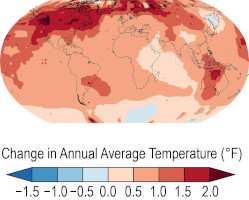Additional Resources
The National Climate Assessment (NCA)
The National Climate Assessment (NCA) is an integral part of USGCRP and acts as a status report about observed and expected changes in climate. The NCA aims to help the federal government prioritize climate science investments, and in doing so will help to provide the science that can be used by communities around the country to plan more sustainably for our future. These assessment reports are published every four years, and sustained assessment process to deliver more timely and useable information is underway. The Fifth National Climate Assessment is available at Globalchange.gov![]() . This report includes chapters relevant to buildings and facilities, such as Energy
. This report includes chapters relevant to buildings and facilities, such as Energy![]() , Built Environment, Urban Systems, and Cities
, Built Environment, Urban Systems, and Cities![]() , and Transportation
, and Transportation![]() .
.
See figures from the Fifth National Climate Assessment at GlobalChange.gov.

Intergovernmental Panel on Climate Change (IPCC) Working Group Report
The Climate Change 2021: The Physical Science Basis report is the most up-to-date physical understanding of the global climate system and climate change, bringing together the latest advances in climate science, and combining multiple lines of evidence from paleoclimate, observations, process understanding, and global and regional climate simulations.
IPCC Working Group | Climate Change 2021: The Physical Science Basis![]()
GAO High Risk List
Every two years, the Government Accountability Office (GAO) examines federal programs and operations that are especially vulnerable to waste, fraud, abuse, and mismanagement, or that need transformative change—the GAO High Risk List. The report reviews the status of areas on the list and outlines steps to lasting solutions.
GAO | 2017 High Risk List: Limiting the Federal Government's Fiscal Exposure by Better Managing Climate Change Risks![]()
GAO's Improved Federal Coordination Could Facilitate Use of Forward-Looking Climate Information in Design Standards, Building Codes, and Certifications
GAO reviewed the use of forward-looking climate information by standards-developing organizations. This report examines (1) what is known about the use of such information in standards, codes, and certifications; (2) challenges standards organizations face to using climate information; and (3) actions federal agencies have taken to address such challenges and additional actions they could take.
GAO | Improved Federal Coordination Could Facilitate Use of Forward-Looking Climate Information in Design Standards, Building Codes, and Certifications![]()
GAO's Federal Supply Chains: Opportunities to Improve the Management of Climate-Related Risks
This report examines (1) the extent to which selected federal agencies have identified climate-related risks to their critical supply chains, (2) the extent to which they have identified and implemented actions to manage these risks, and (3) what is known about the federal government’s fiscal exposure to such risks.
GAO | Federal Supply Chains: Opportunities to Improve the Management of Climate-Related Risks![]()
NAVFAC's Installation Adaptation & Resilience Climate Change Planning Handbook
This document, prepared for the Naval Facilities Engineering Command (NAVFAC) Headquarters, is a desktop workbook to assist Installation planners in analyzing and developing viable action alternative strategies to address challenges they face due to climate change.
FedCenter.gov | Installation Adaptation & Resilience Climate Change Planning Handbook![]()
NOAA’s Digital Coast Sea Level Rise and Coastal Flooding Impacts Viewer
NOAA’s Digital Coast provides coastal intelligence needed to conserve natural resources and make coastal communities more resilient. This viewer provides a way to visualize potential impacts from sea level rise. A slider bar is used to show how various levels of sea level rise will impact coastal communities. The tool also allows users to view confidence levels and predicted shallow coastal flooding geographically.
NOAA | Sea Level Rise Viewer![]()
ASCE’s Infrastructure Report Card
Every four years, the American Society of Civil Engineers’ (ASCE’s) Report Card for America’s Infrastructure depicts the condition and performance of American infrastructure in the familiar form of a school report card—assigning letter grades based on the physical condition and needed investments for improvement.
ASCE.org | Infrastructure Report Card![]()
CBO's The Macroeconomic and Budgetary Effects of Hurricanes Katrina and Rita
The Congressional Budget Office (CBO) estimated the likely consequences of Hurricanes Katrina and Rita for the national economy, federal receipts, and federal outlays.
CBO | The Macroeconomic and Budgetary Effects of Hurricanes Katrina and Rita: An Update Especially Effects on Municipal Bonds![]()
CBO’s Potential Increases in Hurricane Damage in the United States
Congressional Budget Office Potential Increases in Hurricane Damage in the United States: Implication for the Federal Budget See Figure 4 regarding potential for insolvency in 2050 and 2075.
CBO | Potential Increases in Hurricane Damage in the United States: Implications for the Federal Budget![]()
Actuaries Climate Index
Sponsored by the American Academy of Actuaries, Canadian Institute of Actuaries, Casualty Actuarial Society, and Society of Actuaries, the Actuaries Climate Index (ACI) is intended to provide a useful monitoring tool—an objective indicator of the frequency of extreme weather and the extent of sea level change. The ACI is available for the United States and Canada and 12 subregions thereof, and is released when analysis of data for each meteorological season is complete, on both a monthly and a seasonal basis.
Actuaries Climate Index![]()
G-20 FSB’s Task Force on Climate-related Financial Disclosures Recommendations
G-20 Financial Stability Board’s (FSB) Task Force on Climate-related Financial Disclosures Recommendations developed four widely adoptable recommendations on climate-related financial disclosures that are applicable to organizations across sectors and jurisdictions. The Task Force’s recommendations apply to financial-sector organizations, including banks, insurance companies, asset managers, and asset owners. Large asset owners and asset managers sit at the top of the investment chain and, therefore, have an important role to play in influencing the organizations in which they invest to provide better climate-related financial disclosures.
Task Force on Climate-related Financial Disclosures![]()
SASB's Climate Risk Technical Bulletin
This technical bulletin highlights findings related to climate risk arising from research conducted by the Sustainability Account Standards Board (SASB) as part of its standards-setting process. The bulletin provides an overview of where climate-related risk is likely to be present in a typical portfolio, and what types of risk are present, along with the financial implications. It also summarizes the quality of existing disclosure on climate-related risk by SEC registrants.
EEnews.net | Climate Risk Technical Bulletin![]()
BCI's Supply Chain Resilience Report
Business Continuity Institute’s (BCI’s) Supply Chain Resilience Report tracks the origins, causes, and consequences of supply chain disruption across industry sectors and regions worldwide. It also benchmarks business continuity (BC) arrangements in place - including the uptake of insurance - in different organizations which build supply chain resilience.
BCI.org | BCI Supply Chain Resilience Report![]()
Federal Climate Adaptation Plans
On October 7, 2021, the White House announced the release of more than 20 Federal Agency Climate Adaptation and Resilience Plans. As part of these efforts, agencies will embed adaptation and resilience planning and implementation throughout their operations and programs and will continually update their adaptation plans. GSA's Climate Change Risk Management Plan was a part of this release, and the plan will work to address the impacts of climate change, such as extreme heat and sea level rise, using a risk management framework. This will allow the agency to integrate the plan's actions and goals into its enterprise risk management processes, ensuring the impacts of climate change are assessed and managed throughout GSA.
Sustainability.gov | Federal Climate Adaptation Plans![]()
Sustainability.gov | GSA Climate Risk Management Plan![]()


